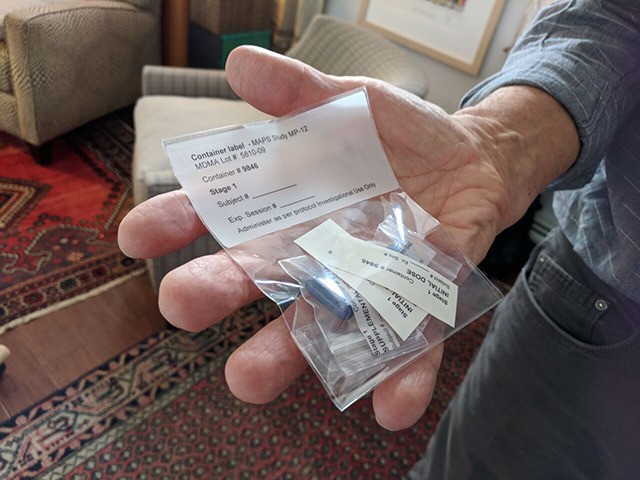Veteran Jonathan Lubecky used to contemplate suicide every single day while battling post-traumatic stress disorder (PTSD), he told Breitbart News in a phone interview last week.
“I was planning to kill myself each and every day,” he said. He actually attempted to do so at least five times.
“The idea of having dreams and a future, and growing old never even entered my mind — for eight years,” he said. “I didn’t expect to be alive in three days because I was constantly thinking of killing myself.”
That changed in November 2014 after he took part in a clinical trial for MDMA-assisted psychotherapy (methylenedioxymethamphetamine), which uses the drug ecstasy to help break down psychological barriers to treatment.
“Five years later, I’m alive. I probably wouldn’t be,” he said. “It saved my life.”
Just weeks ago, the U.S. Food and Drug Administration (FDA) approved MDMA therapy for “expanded access,” which means it has been approved for compassionate use to treat 50 more people at ten sites across the nation as it goes through final clinical trials in the U.S., Canada, and Israel.
Only certain treatments qualify for the FDA’s expanded access program — experimental ones that treat serious or life-threatening illnesses and that have shown themselves to be better than current options.
“FDA approving expanded access is the FDA saying, ‘This is a real thing. This definitely works, and people should be allowed to use it outside the trial for compassionate use,’” Lubecky said.
The treatment entails using MDMA, or ecstasy, to first put the patient in a state in which he or she is receptive to therapy, followed by eight hours of intensive psychotherapy.
The drug enhances feelings of empathy and euphoria while inhibiting feelings of fear — allowing the patient to confront painful memories and trauma. There are several such sessions, three to four weeks apart. It takes approximately four months to complete.
Lubecky said 12 months after the trial he took part in, 68 percent who participated no longer qualified as having PTSD. Of 26 participants in his local group, 20 were veterans and first responders.
With an average of 16.8 veteran suicides a day, Lubecky is hoping other veterans will be able to benefit from MDMA therapy as was he.
As part of expanded access, there are now three slots reserved for active duty service members, he said. The Department of Defense (DOD) has not yet approved service members to participate.
The ten sites under expanded access will be announced in the next few months. Meanwhile, the treatment is expected to finish its phase three trial in 2021 and could be approved by the FDA in 2022.
Lubecky acknowledges some are wary of the idea of using “more drugs” to treat PTSD. However, he said it depends on the severity of PTSD.
He said in some cases, alternative medicine, meditation, church, or working out helps. For others, he said, “a Zoloft a day keeps the demons away.”
But he recalled his own unsuccessful struggle before he tried MDMA.
Lubecky served in Iraq in 2006 at Balad Air Base, nicknamed “Mortaritaville” because the base was mortared constantly. “It was constantly raining bombs,” he said.
In one incident, he was using a Port-a-john when shrapnel blew straight through it. “If I were standing up, I would have been dead,” he said.
After coming home, he had nightmares constantly, woke up drenched in sweat, and suffered flashbacks — not like in the movies, but times when he would hear the sound of a medical evacuation helicopter and not be sure whether it was there or not.
He said he had panic attacks and a short temper. “I’d go off on a f-cking dime,” he recalled.
He tried antidepressants, cognitive behavioral therapy, and other treatments, but nothing worked. He said at one point, he was on 42 pills a day, which tranquilized him “like an elephant.”
He stated that he still constantly thought about suicide but was too sedated to act on those impulses. “There’s no fear of me committing suicide if I can’t do anything,” he said.
After MDMA, those suicidal thoughts are gone, he said. “To tackle PTSD, you need to have many tools in the toolbox. But this is the only treatment that has shown to permanently remove the issues,” he said.
He pointed out that MDMA treatment is not just taking ecstasy and sitting there.
“You don’t just take it and sit there and have fun. … The MDMA puts the mind, body, and spirit in the place it needs to be so that the actual therapy can work,” he said.
Addressing if MDMA is addictive, he said he has only done it three times, followed by intensive therapy sessions, so it was not particularly “enjoyable,” and he has “no real desire to do it again.”
After getting better, Lubecky went on to serve on Rand Paul’s 2016 presidential campaign as the national director for veterans outreach and joined the nonprofit Multidisciplinary Association for Psychedelic Studies (MAPS), which advocates for medical use of psychedelics and marijuana and sponsors MDMA research.
“Here I am, five years later. I have a great life. I have a ton of fun. I’m genuinely happy,” he said.
“My stepson, Joey Monteleone, has a father instead of a folded flag,” he said.
He said he now sees far enough into the future to have a dream job.
“Deputy under secretary of defense for warrior care — the appointee who handles all the wounded warriors for DOD — that’s my dream job,” he stated.
Lubecky said anyone who is interested in applying for expanded access to MDMA therapy should go to mdmaptsd.org.
Follow Breitbart News’s Kristina Wong on Twitter or on Facebook.

COMMENTS
Please let us know if you're having issues with commenting.